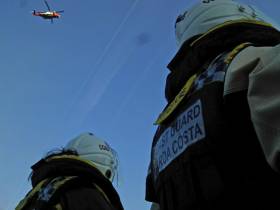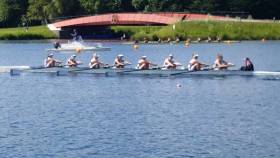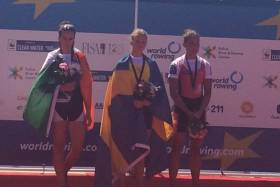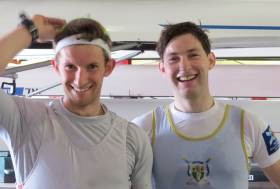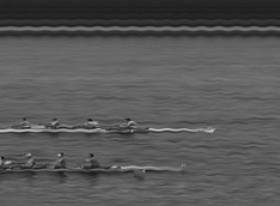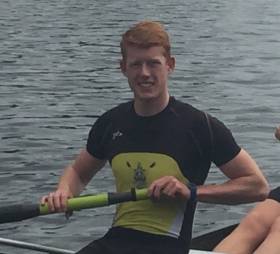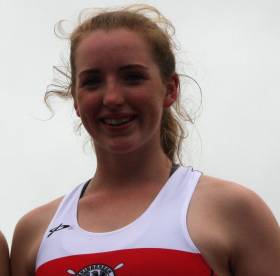Displaying items by tag: Skibbereen
#Skibbereen - TheJournal.ie reports that a 14-year-old boy is in critical condition after he was struck in the head by a boom while yachting off Skibbereen yesterday morning (Saturday 24 June).
The teenager was airlifted to Cork University Hospital by the Irish Coast Guard helicopter Rescue 117, and the latest news from Independent.ie is that his condition was improving.
Elsewhere yesterday, Howth Coast Guard attended a 53-year-old man with serious head injuries sustained while kitesurfing off Sutton in North Co Dublin.
And Shannon’s Rescue 115 was called to Inis Mór in the Aran Islands for the medevac of a woman who suffered spinal injuries while taking part in the Red Bull Cliff Diving World Series event.
NUIG Women's Eight Impress At Metropolitan Regatta
#Rowing: Irish crews had a very successful second day at the Metropolitan Regatta at Dorney Lake. Monika Dukarska of Killorglin and the Skibbereen double of Denise Walsh and Aoife Casey won in the top single and double sculls races, but other crews also impressed. NUIG’s women’s eight finished third in the A Final in Tier One – the crew, which has a number of novice rowers, had also taken third in the morning time trial. Trinity, UCC, Shandon, Galway, Cork and UCD were amongst the crews which also came away with encouraging results over the weekend.
Metropolitan Regatta, Dorney Lake, Day Two (Selected Results; Irish interest)
Men
Eights – Tier One, Final B: 2 NUIG A, 3 UCD (A). Final C: 1 Trinity 6:07.65. Final D: 2 UCD. Final F: 1 NUIG (B) 6:25.61. Final I: 2 Trinity (D), 3 UCD (C).
Four – Tier Three Final: 1 UCC 6:36.53.
Four, coxed – Championship Final: 3 NUIG (B).
Pair – Tier Two Final: 2 UCC
Sculling, Double
Tier Two Final: 2 Shandon
Women
Eight – Tier One – Final A: 3 NUIG (A). Final B: 2 Commercial. Final C: 3 Galway. Final D: 2 NUIG.
Four, coxed – Tier Three: 3 Galway Rowing Club.
Pair - Tier One Final: 2 Cork (G Collins, L Dilleen)
Sculling, Double – Tier One Final: 1 Skibbereen 7:17.56.
Single – Tier One: 1 Killorglin (M Dukarska); 3 UCD (A Crowley).
Walsh and Casey Win on London Olympic Course
#Rowing: Denise Walsh followed up her excellent silver medal at the European Championships in the Czech Republic with a win on the Olympic course at Dorney Lake in England today. Walsh partnered Aoife Casey, who has just turned 18, to a win in the Championship Double at Metropolitan Regatta. The Skibbereen double rowed well in the top event for women’s doubles at this big event, covering the course in seven minutes 13.27 seconds.
UCD Senior Eight the Afloat Rowers of the Month
#Rowing: The Afloat Rowers of the Month for April are the UCD men’s senior eight. The crew, stroked by David O’Malley, beat Commercial, the champions of Ireland, at Skibbereen Regatta. They went on to Trinity Regatta and beat the hosts with another fine performance.
The winning crew at Skibbereen Regatta was: Sam Bolger, Shane O’Connell, Tiarnan Doherty, Max Murphy, Shane Mulvaney, Andrew Griffin, Eoin Gleeson, David O’Malley, Orlagh Reid (cox). James O’Sullivan replaced Shane O’Connell in the crew for Trinity.
Rower of the Month awards: The judging panel is made up of Liam Gorman, rowing correspondent of The Irish Times, and David O'Brien, editor of Afloat magazine. Monthly awards for achievements during the year will appear on afloat.ie. Keep a monthly eye on progress and watch our 2017 champions list grow.
Skibbereen and UCD Race in World-Class Quadruple at NRC
#Rowing: The men’s quadruple gave four top internationals the chance to show their speed at Skibbereen Regatta. Shane O’Driscoll, Paul O’Donovan, Gary O’Donovan and Mark O’Donovan won in a very good time of six minutes 29.9 seconds. NUIG’s two women’s coxed fours were also impressive – the B crew won well from the A crew in the Division One A Final. Two junior 16 competitors from Castleconnell, Norma Silke and Lauren O’Brien, zoomed away from the rest to win the Division Two double sculls, while Lee’s senior crew took the honours in the women’s quadruple. Enniskillen’s junior 18 crew won the Division One coxed four.
Skibbereen Grand League Regatta, National Rowing Centre, Day One (Selected Results; with Per Centage of Projected World Best Time)
Men
Eight – Division Two – A Final: 1 Queen’s (nov) 7:04.6. 3 Univ of Limerick (club two) 7:25.3, 6 Col Iognaid (jun 16) 7:40.6.
Four, coxed – Div One – A Final: 1 Enniskillen (jun 18A) 7:09.5 (82.18), 2 UCD (inter) 7:11.7 (81.78), 3 NUIG (sen) 7:12.9 (81.54). B Final: 2 NUIG (club one) 7:29.8 (78.48).
Pair – A Final: 1 Skibbereen (sen) 7:43.6 (80.46), 2 Commercial (sen) 7:50.8, 3 Enniskillen (jun 18A) 7:56.4; 4 Cork A (inter) 8:04.8 (76.95). C Final: 3 St Michael’s (club one) 8:10.1 (76.11).
Sculling,
Quadruple – Division One – A Final: 1 Skibbereen/UCD (sen) 6:29.9 (85.41), 2 Commercial (sen) 6:49.0 (81.42), 3 Shandon (jun 18A) 6:52.2 (80.79), 4 St Michael’s (club one) 7:11.0 (77.26).
Double – Div Two – A Final: 1 Castleconnell (jun 16) 8:51.7, 2 Shandon (club two) 9:17.3 (71.24). B Final: 2 Athlunkard (jun 18B) 9:57.4.
Single – A Final: 1 UCD (P O’Donovan; senior) 7:58.3 (81.78 per cent), 2 Skibbereen (G O’Donovan; sen) 8:03.4 (80.88), 3 UCD (A Goff; lightweight) 8:17.1 (78.66). B Final: 2 Skibbereen (K Mannix; intermediate) 8:21.6 (77.95); 5 Three Castles (R Quinn; jun 18A) 8:36.4 (75.71).
Women
Eight – Div Two – A Final: 1 Shandon (club two) 7:47.5; 4 NUIG (nov) 8:09.8. 5 Col Iognaid (jun 16) 8:12.8. Four, coxed – Division One – A Final: 1 NUIG B (inter) 8:03.5 (80.87), NUIG A (inter) 8:12.6 (79.37), 3 Cork (sen) 8:18.4 (78.45); 6 UCC (club one) 8:40.7 (75.9).
Pair – A Final: 1 UCC (sen) 8:39.8 (79.06), 2 Cork (inter) 8:40.5 (78.96), 3 Fermoy (jun 18A) 8:47.1 (77.97). B Final: 3 Belfast BC (club one) 9:14.9 (74.07); 6 Cork A (jun 18A) 9:35.7 (71.39)
Sculling
Quadruple – Div One – A Final: 1 Lee (sen) 7:35.2 (80.18), 2 Fermoy, Carlow, Skibbereen, Kenmare 7:36.6 (79.94), 3 Workmans (jun 18A) 7:48.1 (77.98).
Div Two, coxed – A Final: Cork (jun 18B) 8:34.6, 2 Lee A (club two) 8:47.4, 3 Carlow (jun 16), 4 Garda (club two) 9:00.0. B Final: 2 UCD A (nov) 9:21.4.
Double – Div Two – A Final: 1 Castleconnell (jun 16) 8:51.7, 2 Shandon (club two) 9:17.3. B Final: 2 Athlunkard (jun 18B) 9:57.4.
Single – A Final: 1 Old Collegians (S Puspure; sen) 8:33.5 (82.97), 2 Killorglin (M Dukarska; sen) 8:45.0 (81.14), 3 UCD (A Crowley; inter) 9:06.8 (77.91). B Final: 3 Col Iognaid (C Nic Dhonncha; jun 18A) 9:38.1 (73.69), 4 Lee Valley (E O’Mahony; club one) 9:45.6 (72.75).
O'Donovans Lead International Brigade at Skibbereen
#Rowing: Paul O’Donovan maintained his dominance in the single sculls with a win over his brother, Gary, at the Skibbereen Grand League Regatta at the National Rowing Centre. Daire Lynch missed the race through illness. Shane O’Driscoll and Mark O’Donovan of the host club were emphatic winners of the pair, but Shane Mulvaney and David O’Malley had withdrawn from the heats because Mulvaney had suffered heart palpitations. He was taken the hospital for observation.
Sanita Puspure won the single sculls final with over 11 seconds to spare over Monika Dukarska. Aileen Crowley of UCD, just back from Australia, was third. The women’s pair was won by the UCC crew of Aifric Keogh and Aoife Feeley. UCD’s Ruth Gilligan and Eimear Lambe, with a reverse of the usual order which saw Gilligan move to stroke, did not do well in the heat and competed in the B Final.
Skibbereen Grand League Regatta, National Rowing Centre (Selected Results; with Per Centage of Projected World Best Time)
Men
Eight – Division Two – A Final: 1 Queen’s (nov) 7:04.6. 3 Univ of Limerick (club two) 7:25.3, 6 Col Iognaid (jun 16) 7:40.6.
Pair – A Final: 1 Skibbereen (sen) 7:43.6 (80.46), 2 Commercial (sen) 7:50.8, 3 Enniskillen (jun 18A) 7:56.4; 4 Cork A (inter) 8:04.8 (76.95). C Final: 3 St Michael’s (club one) 8:10.1 (76.11).
Sculling
Single – A Final: 1 UCD (P O’Donovan; senior) 7:58.3 (81.78 per cent), 2 Skibbereen (G O’Donovan; sen) 8:03.4 (80.88), 3 UCD (A Goff; lightweight) 8:17.1 (78.66). B Final: 2 Skibbereen (K Mannix; intermediate) 8:21.6 (77.95); 5 Three Castles (R Quinn; jun 18A) 8:36.4 (75.71).
Women
Pair – A Final: 1 UCC (sen) 8:39.8 (79.06), 2 Cork (inter) 8:40.5 (78.96), 3 Fermoy (jun 18A) 8:47.1 (77.97). B Final: 3 Belfast BC (club one) 9:14.9 (74.07); 6 Cork A (jun 18A) 9:35.7 (71.39)
Sculling
Quadruple – Div Two, coxed – A Final: Cork (jun 18B) 8:34.6, 2 Lee A (club two) 8:47.4, 3 Carlow (jun 16), 4 Garda (club two) 9:00.0.
1 Tralee (jun 16) 9:08.7. 2 Flesk Valley (nov) 9:16.0, 3 Cork (club two) 9:52.3
Single – A Final: 1 Old Collegians (S Puspure; sen) 8:33.5 (82.97), 2 Killorglin (M Dukarska; sen) 8:45.0 (81.14), 3 UCD (A Crowley; inter) 9:06.8 (77.91). B Final: 3 Col Iognaid (C Nic Dhonncha; jun 18A) 9:38.1 (73.69), 4 Lee Valley (E O’Mahony; club one) 9:45.6 (72.75).
Commercial the Senior Eights Rowing Champions of Ireland
#Rowing: Commercial won the senior eights championship of Ireland (the 'Big Pot') in a race with a thrilling finish at the Irish Rowing Championships. The Dublin crew took over the lead at halfway, but could not shake off UCD. In the final 250 metres, UCD charged and seemed set to catch Commercial, but the eventual winners found something and surged. The margin in an extremely fast race - Commercial recorded a time of five minutes 36.892 seconds - was less than a third of a second.
Skibbereen, in combination with UCC, won the women's senior eight. This was a much more emphatic win, with UCD challenging but not able to catch the winners. Skibbereen added the women's junior quadruple and the men's intermediate double titles to take their overall tally for the Championships to 13 - they now have 163 in total, 11 clear of nearest rivals, Neptune (152).
Marie Piggott of NUIG was a very clear winner of the women's intermediate single. Commercial were also in charge in their win in the men's junior pair.
Cork completed a good set of results for them when they won the women's club eight.
Irish Rowing Championships, National Rowing Centre, Day Three (Selected Results, Finals)
Men
Eights - Senior: 1 Commercial (D Joyce, M Maher, R Peguet, S Mac Eoin, F Groome, D Burke, C Dowling, N Gahan; cox: M Crockett) 5:36.892, 2 UCD A 5:37.220, 3 NUIG 5:44.377. Four - Club, coxed: NUIG 6:33.156.
Pair - Inter: Portora 6:49.900. Junior: 1 Commercial 7:00.686, 2 Portora B 7:02.186, 3 Portora A 7:03.905.
Sculling, Double - Inter: Skibbereen 6:33.887. Junior: 1 Shandon A 6:36.777, 2 Clonmel 6:39.324, Castleconnell A 6:51.168.
Lightweight Single: 1 Skibbrereen (S O'Driscoll) 7:15.482, 2 Skibbereen (A Burns) 9:08.433, 3 Carlow (O Nolan) 7:36.764.
Women
Eight- Senior: 1 Skibbereen/UCC (L Murphy, N Casey, O Hayes, C J Hearne, N O'Mahony, A Feeley, A Keogh, D Walsh; cox R O'Leary) 6:24.548, 2 UCD 6:29.778, 3 Trinity 6:40.377. Club: Cork 6:39.339.
Four - Inter, coxed: Commercial 7:20.348.
Pair - Junior: 1 Cork 7:35.640, 2 Bann 7:41.453, 3 Shannon 7:41.750
Sculling - Quadruple - Junior: 1 Skibbereen 6:46.308, 2 Bann 6:53.292, 3 Lee 6:59.527.
Single - Inter: NUIG (M Piggott) 7:58.822.
Lightweight Single: Skibbereen (D Walsh) 7:54.535, 2 Carlow (A Byrne) 8:21.130, 3 Queen's (R Brown) 8:33.287.
#Rowing: Skibbereen brought their tally of titles for the Irish Rowing Championships to a remarkable 10 so far as Denise Walsh and Shane O'Driscoll had big wins in the lightweight single sculls in the morning session of the third day.
Shandon's win in the men's junior double was a sweet one for Stephen O'Sullivan and Ronan Byrne. They led Clonmel all down the course and held off push after push in the final 500 metres. Strokeman O'Sullivan shouted with joy at the finish, but it was a particularly big win for Byrne. He had been beaten by the Clonmel strokeman, Daire Lynch, in the junior single. Byrne and Lynch team up in the Ireland junior double for the World Championships.
Cork Boat Club's good run in junior events continued, as Amy Mason and Tara Hanlon won the junior pair. Portora won the men's intermediate pair and NUIG the club coxed four. Commercial led all the way in the women's intermediate four and had a clearwater margin at the finish.
Irish Rowing Championships, National Rowing Centre, Day Three (Selected Results, Finals)
Men
Four - Club, coxed: NUIG 6:33.156.
Pair - Inter: Portora 6:49.900.
Sculling, Double - Junior: 1 Shandon A 6:36.777, 2 Clonmel 6:39.324, Castleconnell A 6:51.168.
Lightweight Single: 1 Skibbrereen (S O'Driscoll) 7:15.482, 2 Skibbereen (A Burns) 9:08.433, 3 Carlow (O Nolan) 7:36.764.
Women
Four - Inter, coxed: Commercial 7:20.348.
Pair - Junior: 1 Cork 7:35.640, 2 Bann 7:41.453, 3 Shannon 7:41.750
Sculling - Lightweight Single: Skibbereen (D Walsh) 7:54.535, 2 Carlow (A Byrne) 8:21.130, 3 Queen's (R Brown) 8:33.287.
#Rowing: Skibbereen took two of the three senior titles on offer in the evening session of the second day of the Irish Rowing Championships at the National Rowing Centre. The women's pair of Denise Walsh and Aoife Casey beat UCC, while the men's quadruple held off a late charge by a Queen's/Portadown composite.
Monika Dukarska of Killorglin won the women's senior single. She was dominant all the way, with only Siobhan McCrohan of Tribesmen testing her to any degree.
The junior women's eight gave Cork Boat Club a chance to impress. They led for most of the race, and while Bann held an overlap through the middle of the course, Cork were clear winners.
Trinity were extraordinarily dominant in the men's novice eight - their win by 11 seconds was cheered lustily by their fans.
Shandon fought through the opposition offered by Carlow to win the junior men's quadruple, and Roisin Maguire of Queen's was the best club single sculler.
The man of the day was, arguably, the Clonmel competitor Daire Lynch. The teenager added the men's intermediate single scull to the club title he had won earlier in the day. He passed Declan O'Connor of St Michael's in the middle stages of the race and won well.
Irish Rowing Championships, National Rowing Centre, Cork
Day Two (Selected results)
Men
Eight - Intermediate: Commercial 5:43.182. Novice: Trinity 6:00.157.
Four - Junior, coxed: 1 Cork A 6:29.20, 2 Portora 6:35.341, 3 Clonmel 6:40.716.
Pair - Senior: 1 Skibbereen 6:30.311, 2 UCD 6:33.546, 3 Portora 6:44.968.
Sculling, Quadruple - Senior: 1 Skibbereen 5:59.102, 2 Queen's/Portadown 5:59.790, 3 Shandon A 6:08.509. Junior: 1 Shandon 6:07.970, 2 Carlow B 6:13.361, 3 Three Castles 6:13.799.
Single - Inter: Clonmel (D Lynch) 7:04.573. Club: Clonmel (D Lynch) 7:15.463.
Women
Eight - Novice: Trinity 7:09.594. Junior: 1 Cork 1 Cork 6:39.271, 2 Bann 6:44.193, 3 Portora 6:49.287.
Pair - Senior: 1 Skibbereen 7:23.775, 2 UCC 7:29.369, 3 Trinity 7:46.166.
Sculling, Double - Inter: Lee 7:22.252.
Single - Senior: 1 Killorglin (M Dukarska) 7:35.069, 2 Tribesmen (S McCrohan) 7:50.320, 3 Skibbereen (O Hayes) 7:57.742. Club: Queen's (R Maguire) 8:15.155. Junior: 1 Skibbereen (E Hegarty) 8:05.674, 2 Neptune (C Feerick) 8:13.065, 3 Castleconnell (J Vascotto) 8:15.002.
Cork Four Beat Portora at Irish Rowing Championships
#Rowing: Cork Boat Club won the men's junior 18 coxed four at the National Rowing Championships today. On Friday, Portora had beaten Cork in the junior eight by leading all the way, but Cork turned the tables - they took the lead early and won by over six seconds. Daire Lynch, who won the junior single on the first day, added the club title with an emphatic win.
Emily Hegarty took the junior women's single by a huge margin, and her Skibbereen clubmates, Mark O'Donovan and Shane O'Driscoll, augmented the club's growing honour list by taking the men's senior pair. Their main rivals, UCD's Shane Mulvaney and David O'Malley, were over three seconds behind at the finish.
Commercial had a stirring win in the men's intermediate eight. UCD led to half way, just holding off Commercial, and it looked like there might be a battle between the two crews from there. But Commercial, stroked by Neil Gahan, moved away and won well in an excellent time.
In the women's novice eight Trinity won well, and Lee were commanding in their victory in the women's intermediate double.
Irish Rowing Championships, National Rowing Centre, Cork
Day Two (Selected results)
Men
Eight - Intermediate: Commercial 5:43.182.
Four - Junior, coxed: 1 Cork A 6:29.20, 2 Portora 6:35.341, 3 Clonmel 6:40.716.
Pair - Senior: 1 Skibbereen 6:30.311, 2 UCD 6:33.546, 3 Portora 6:44.968.
Sculling
Single - Club: Clonmel (D Lynch) 7:15.463.
Women
Eight - Novice: Trinity 7:09.594.
Sculling, Double - Inter: Lee 7:22.252.
Single - Junior: 1 Skibbereen (E Hegarty) 8:05.674, 2 Neptune (C Feerick) 8:13.065, 3 Castleconnell (J Vascotto) 8:15.002.


























